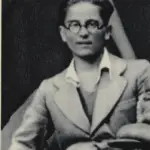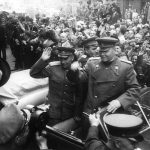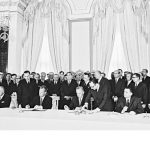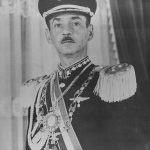 1942 – Qemal Stafa is killed. Also a writer of poems and literary essays under the pseudonym Brutus, which were summarized in the volume “Autumn Reprimands.” After the death of his father, the Stafa family moved to Tirana in July 1936. At the beginning of the school year ’36 -’37 he enrolled in the State Gymnasium of Tirana. With the organization of Zef Malës, Qemali together with Vasil Shanton, Gj. Luka, T. Jakova found the Communist Group of Shkodra. In 1938, the hunt for arrests by the regime of King Zog began, from which Qemali was arrested on the night of January 24, 1939. His trial took place in the first weeks of February in the basement of the Municipality of Tirana, protected by av. Suat Asllani, a trial in which he admits all charges and is sentenced to three years. On the occasion of the death of his brother he is given permission to go to wait. While he was crammed into one of the cells of the Old Prison, he was able to escape during the April 7 riots. The day of his assassination has been used as a symbol to commemorate Martyrs’ Day.
1942 – Qemal Stafa is killed. Also a writer of poems and literary essays under the pseudonym Brutus, which were summarized in the volume “Autumn Reprimands.” After the death of his father, the Stafa family moved to Tirana in July 1936. At the beginning of the school year ’36 -’37 he enrolled in the State Gymnasium of Tirana. With the organization of Zef Malës, Qemali together with Vasil Shanton, Gj. Luka, T. Jakova found the Communist Group of Shkodra. In 1938, the hunt for arrests by the regime of King Zog began, from which Qemali was arrested on the night of January 24, 1939. His trial took place in the first weeks of February in the basement of the Municipality of Tirana, protected by av. Suat Asllani, a trial in which he admits all charges and is sentenced to three years. On the occasion of the death of his brother he is given permission to go to wait. While he was crammed into one of the cells of the Old Prison, he was able to escape during the April 7 riots. The day of his assassination has been used as a symbol to commemorate Martyrs’ Day.
 1945 – The Prague Uprising begins at the end of World War II. This armed uprising starts as an attempt by the Czech resistance to liberate the city from German occupation. Fighting between the Czech resistance, backed by the Soviet Red Army, on the one hand, and Nazi German troops, on the other, would last nearly a week. Eventually, the Germans would withdraw from the city.
1945 – The Prague Uprising begins at the end of World War II. This armed uprising starts as an attempt by the Czech resistance to liberate the city from German occupation. Fighting between the Czech resistance, backed by the Soviet Red Army, on the one hand, and Nazi German troops, on the other, would last nearly a week. Eventually, the Germans would withdraw from the city.
 1955 – A General Treaty recognizing France, Britain, and the United States recognizes the sovereignty of West Germany. This treaty officially recognized the status of Germany as an occupied territory and recognized its rights as a sovereign state. But these recognitions were subject to certain restrictions that remained in force until the reunification of the German nation in 1990.
1955 – A General Treaty recognizing France, Britain, and the United States recognizes the sovereignty of West Germany. This treaty officially recognized the status of Germany as an occupied territory and recognized its rights as a sovereign state. But these recognitions were subject to certain restrictions that remained in force until the reunification of the German nation in 1990.
 1964 – The Council of Europe declares May 5 as Europe Day. Europe Day is celebrated on May 5 by the Council of Europe and on May 9 by the European Union. The European Union later began celebrating its European Day in commemoration of the 1950 Schuman Declaration, referring to it as “Schuman Day” or “United Europe Day”. Both days are celebrated by displaying the European Flag.
1964 – The Council of Europe declares May 5 as Europe Day. Europe Day is celebrated on May 5 by the Council of Europe and on May 9 by the European Union. The European Union later began celebrating its European Day in commemoration of the 1950 Schuman Declaration, referring to it as “Schuman Day” or “United Europe Day”. Both days are celebrated by displaying the European Flag.
 1980 – During Operation Nimrod, the British Special Air Force attacks the Iranian embassy in London after a six-day siege. The siege of the Iranian embassy took place from April 30 to May 5, 1980, after a group of six gunmen attacked the Iranian embassy in South Kensington, London. As a result of this attack, 1 hostage was killed and a SAS officer was wounded. The hostages were all eliminated.
1980 – During Operation Nimrod, the British Special Air Force attacks the Iranian embassy in London after a six-day siege. The siege of the Iranian embassy took place from April 30 to May 5, 1980, after a group of six gunmen attacked the Iranian embassy in South Kensington, London. As a result of this attack, 1 hostage was killed and a SAS officer was wounded. The hostages were all eliminated.
 1988 – Born in London, Adele. Adele is an English singer-songwriter. She is considered one of the most famous British music singers in Europe and in the world. In 2012, she was ranked number five in the top 100 women in VH1 music. Time magazine named her one of the most influential people in the world in 2012 and 2016. Throughout her artistic career, Adele has sold about 120 million records.
1988 – Born in London, Adele. Adele is an English singer-songwriter. She is considered one of the most famous British music singers in Europe and in the world. In 2012, she was ranked number five in the top 100 women in VH1 music. Time magazine named her one of the most influential people in the world in 2012 and 2016. Throughout her artistic career, Adele has sold about 120 million records.
 1994 – The signing of the Bishkek Protocol between Armenia and Azerbaijan effectively ceases, the Nagorno-Karabak conflict. The Bishkek Protocol is an interim ceasefire agreement signed by Armenian representatives Babken Ararktsian, Azerbaijan (Afiyaddin Jalilov) and Russia’s representative to the OSCE Minsk Group Vladimir Kazimirov. This protocol is still in force today.
1994 – The signing of the Bishkek Protocol between Armenia and Azerbaijan effectively ceases, the Nagorno-Karabak conflict. The Bishkek Protocol is an interim ceasefire agreement signed by Armenian representatives Babken Ararktsian, Azerbaijan (Afiyaddin Jalilov) and Russia’s representative to the OSCE Minsk Group Vladimir Kazimirov. This protocol is still in force today.
 2002 – Hugo Banzer dies at the age of 75. Banzer was a Bolivian politician, military general and President of Bolivia. He held the presidency of Bolivia twice, from 1971 to 1978, as dictator, and then again from 1997 to 2001, as constitutional president. Banzer died of lung cancer at a medical clinic in Santa Cruz de la Sierra. His remains were buried in Santa Cruz Cemetery in Santa Cruz.
2002 – Hugo Banzer dies at the age of 75. Banzer was a Bolivian politician, military general and President of Bolivia. He held the presidency of Bolivia twice, from 1971 to 1978, as dictator, and then again from 1997 to 2001, as constitutional president. Banzer died of lung cancer at a medical clinic in Santa Cruz de la Sierra. His remains were buried in Santa Cruz Cemetery in Santa Cruz.








